How to Get into FAANG Despite Career Gaps, No Experience & No CS Degree
 Thomas Cherickal
Thomas Cherickal
Work with the best people and never lose your passion for the job!
These days, companies do not care about an Ivy League college degree, years of experience, employment gaps, and age - unless you go through the traditional job recruitment process (submit a resume, wait for a response - all the best).
In this article, I explain how you can get a job in FAANG without any of the abovementioned qualifications.
Regardless of whether you have a gap in your career (or multiple gaps), not enough years of experience, your age, your nationality, or even if you don’t have a degree (not even a Bachelor’s):
Companies prefer code monkeys with poor credentials over postgraduates who cannot code (that’s real, believe it or not).
Can you code well with experience in remarkable projects on an online portfolio?
Do you know how to write clean code with full test coverage?
Have you been practicing your DSA skills from the basic to the advanced?
Do you know the LLD and HLD of System Design?
Are you confident in your communication skills?
Do you learn fast?
Can you handle stress?
If you can say yes to the seven questions above, you can land a job in FAANG.
And if you are a person ineligible under traditional hiring criteria:
I have the perfect open-source and free solution for you.
Coding Roadmaps For All Technologies
This resource helps you understand what programming concepts to learn and in what order, starting from the very basics.
Say hi to:
roadmap.sh
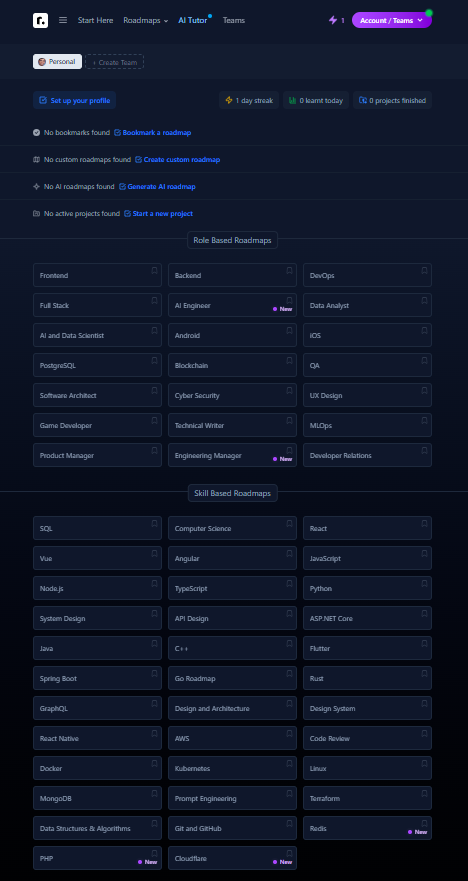
Screenshot by the author: All these resources/links to the relevant tutorials in order, free!
Website:
GitHub: https://github.com/kamranahmedse/developer-roadmap
roadmap.sh provides visual, chart-based roadmaps for various skill-based roles:
Core Software Development Roles:
Frontend Developer
Backend Developer
Full Stack Developer
Platform/Specialization Specific Roles:
Android Developer
iOS Developer
Flutter Developer
React Native Developer
ASP.NET Core Developer
Infrastructure & Operations Roles:
DevOps Engineer
Cyber Security Engineer/Professional
Data & AI Roles:
AI and Data Scientist
Prompt Engineer
Other Technical Roles:
Blockchain Developer
QA Engineer (Quality Assurance)
Software Architect
Game Developer
Technical Writer
Programming Languages:
JavaScript
Python
Java
Go (Golang)
Rust
PHP
C++
TypeScript
Ruby
Frontend Frameworks/Libraries:
React.js
Angular
Vue.js
Svelte
Backend Frameworks/Platforms:
Node.js
ASP.NET Core
Spring
Django
Flask
Ruby on Rails
Laravel
Databases & Query Languages:
SQL (Structured Query Language)
PostgreSQL
MongoDB
GraphQL
DevOps & Infrastructure Tools:
Docker
Kubernetes
Core Concepts & Methodologies:
Computer Science
System Design
Design Patterns
Design Systems
API Design
Code Review
It's like a map showing the "landmarks" (concepts, tools, languages) you need to visit on your learning journey, using flowcharts or mind maps.
Excellent for absolute beginners because it visually lays out the entire landscape.
It answers the common beginner question: "What should I learn next?"
It demystifies the complex world of tech roles by breaking them down into learnable chunks.
Overwhelmed by the sheer amount required to learn?
Follow the instructions below!
Choose one role of your choice (after sufficient research) and follow it religiously.
Do as many projects as you can and add them to an online portfolio showcase (more on this later).
Make each project as remarkable as possible.
Roles that are hot right now: AI Engineer, Data Scientist, Blockchain Developer, DevOps Engineer.
Pay special attention to these modules: System Design, Data Structures and Algorithms, Git and GitHub, API Design, and Design Patterns.
As a beginner, start with Prompt Engineering, Python, SQL, and Computer Science.
Community Resources

There is the road and this article is the roadmap! Of course, you have competition as well…
The roadmaps are community-driven via GitHub.
This means they are constantly updated by experienced developers to reflect current industry standards and trends.
You can see discussions, suggest changes, and even contribute.
Caveat
roadmap.sh tells you what to learn and the general order.
It's a guide with links to the material, not a course in itself.
You use it to structure your learning and find separate resources (like documentation, tutorials, or the options below) for each topic on the map.
Links are given for every resource.
Cover the links, do your own projects every week for a period of six months, with dedication:
And you are well along your way to a FAANG job.
Bonus tip: In your portfolio, link to the deployed versions of your projects.
Choose free deployment options.
You need to create a developer portfolio website once you have done some significant projects.
Creating a developer portfolio website is a complex topic and deserves another article that I might cover another day.
Projects, Projects, Projects
Do at least 6 LeetCode problems daily (I recommend 3 easy, 2 medium, 1 hard - and do not cheat with AI!)
This will prepare you for coding interviews.
Learn hash tables, recursion, and as many algorithms (greedy, dynamic, sorting, searching, among others) as possible
Focus on the concepts, not just the code.
Learn the basics of version control (Git and GitHub) early.
You must know all basic Git commands.
I’m not expecting rebase, but at least commit and revert level, along with push, pull, fetch, init, add, origin, and repository setup.
This is crucial for working in large companies.
Start building projects every single week.
If you have an idea, note it down.
Use Notion or Google Keep.
Reserve 3 days every week for project building, even from a very elementary stage.
Use Google Gemini 2.5. Pro or 2.5 Flash as your AI teacher
LLMs will not be bored by endless repetition.
It will not scold you.
You can ask even the simplest doubts.
It will accommodate your every need.
You can ask as many times as you want, on any concept you want, and any explanation you need, and the LLM will give you exactly what you ask for.
Note: Consider learning the Prompt Engineering Roadmap first.
Once you are proficient in a language (I recommend Python), start using Gemini itself to generate your code.
This is perhaps the most controversial suggestion.
Many think that getting to understand everything you generate is essential.
I agree. Hence:
Run the AI-generated code through Gemini and let the AI explain everything you do not understand.
You cannot work in a company without understanding your code.
If you see code you do not understand:
Run it yourself and make changes, tinker, toy, play with it until you understand it thoroughly.
And: read the docs!
If you want to be a data scientist, do Deep-ML instead of LeetCode (Google it).
Deep-ML is LeetCode for data scientists.
It offers a wide variety of AI-ML questions.
Do not use AI!
Think for yourself, and solve it without AI.
Feeling uncomfortable is the quickest way to success - Sujan Patel in Forbes (2016)
The World of Open-Source
Learn at least one new open-source tool every two weeks for six months.
One way to wow your interviewers is to build a project that the industry adopts.
My suggestions for learning open-source projects:
Docker, Scikit-Learn, PyTorch, Redis, FastAPI, Flask, Pandas, MongoDB.
For a more Gen AI-based, agents-first list:
LangChain, CrewAI, Aider, Microsoft AutoGen, GPT-Engineer, AgentGPT, MCP, A2A.
I suggest learning Generative AI and Prompt Engineering regardless of your career choice.
Add AI Agents to the list as well.
That should take care of an important step: future-proofing your career!

Future-proof your career by learning Prompt Engineering first!
Low-Level Design and High-Level Design in System Design knowledge are required for all candidates today.
While roadmap.sh covers System Design, there is another free, excellent resource you should also use:
System Design Primer
This free and open-source GitHub repository is an excellent source for System Design learning resources.
The case studies of existing companies like Netflix are an absolute must-read.
This will take you a long way forward in understanding how the MAANG companies work internally.
It is one of the most comprehensive resources out there.
Again, it is a roadmap, with links to the actual courses and blogs.
Read three articles or 60 minutes of videos from this resource daily.
Consistency and hard work will pay off in the long run.
Six months of this, and you will be ready for any interview.
Some books will help you on your path to cracking FAANG.
I will list them (some of them) close to the end of this article.
Building a Professional LinkedIn Profile
Build a profile on LinkedIn and share your learning there.
By sharing interesting and authoritative blogs on your chosen skill stacks, you present yourself to a huge circle of IT professionals.
Some blog posts may even land you job offers and freelance work.
I speak from personal experience here.
As far as LinkedIn is concerned, the more technical your blog, the better.
Make sure it aligns with your chosen career path.
Comment and engage with fellow professionals.
While less than 0.5% of direct resume applications are selected today:
Selection rates go up to 20%-50% in the case of internal referrals.
But:
Do not just ask for a referral directly.
Instead:
Build a relationship with an expert in your field.
Show interest in their work.
Like and comment on their posts.
Do not use AI, actually comment with your own thoughts.
In Direct Messages (DMs), feel free to ask for clarification on your doubts.
Experts will be happy to guide you to resources, or:
In the case of complex questions, they will most likely answer them directly.
Once you are well-known to your company connections:
Ask for a referral to the person who is your personal friend through your interaction online.
But this process should be at least 3-6 months long, and you should have verifiably demonstrated your expertise to your connection and your audience on LinkedIn.
There is nothing more repulsive than a random stranger coming up to you and asking for a referral blindly.
Make sure you have built a bond with the person you want a referral from!
Books that You Should Not Miss on Your Job Interview Preparation
(No affiliate links below!)
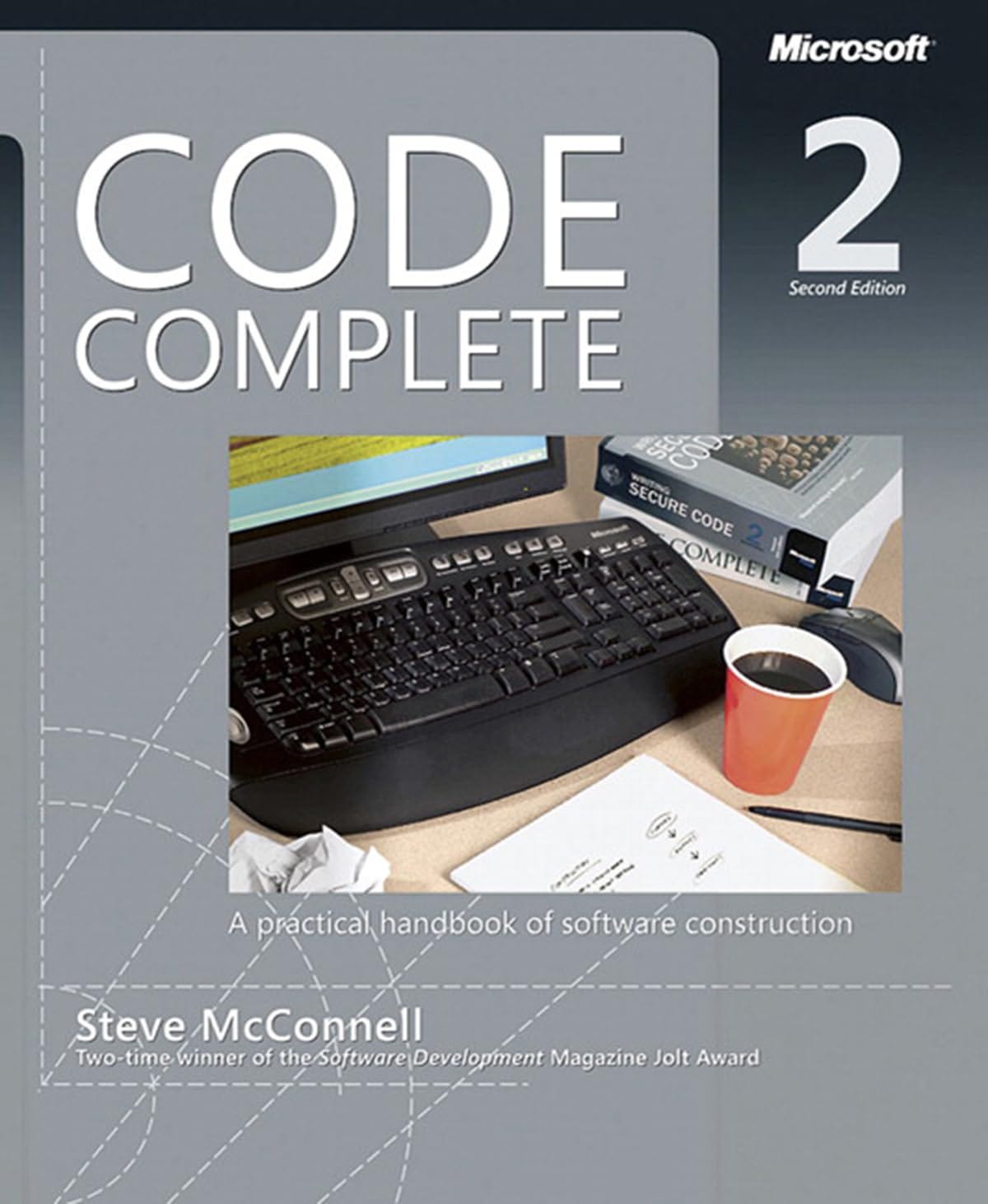
Code Complete (2nd Edition) by Steve McConnell
A comprehensive guide to software construction. It bridges the gap between academic knowledge and real-world development, covering everything from detailed coding techniques to project management. Essential for writing high-quality, maintainable code – a key trait assessed in interviews.
https://www.amazon.com/Code-Complete-Practical-Handbook-Construction/
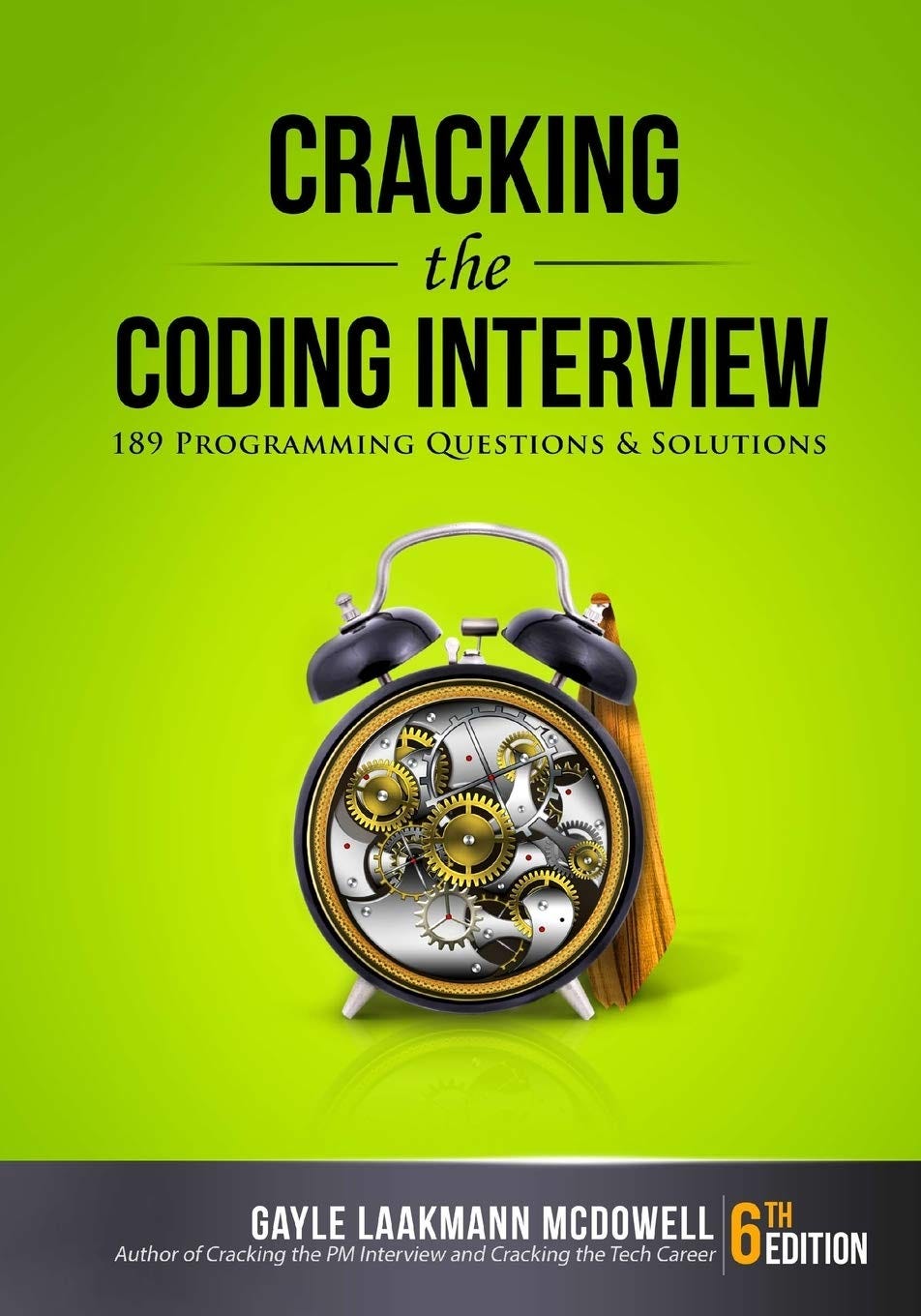
Cracking the Coding Interview (6th Edition) by Gayle Laakmann McDowell
The quintessential guide for coding interview preparation. It breaks down the interview process, provides strategies, and offers 189 real programming questions with detailed solutions covering data structures, algorithms, and core concepts frequently tested at top tech companies. Absolutely fundamental practice material.
https://www.amazon.com/Cracking-Coding-Interview-Programming-Questions/
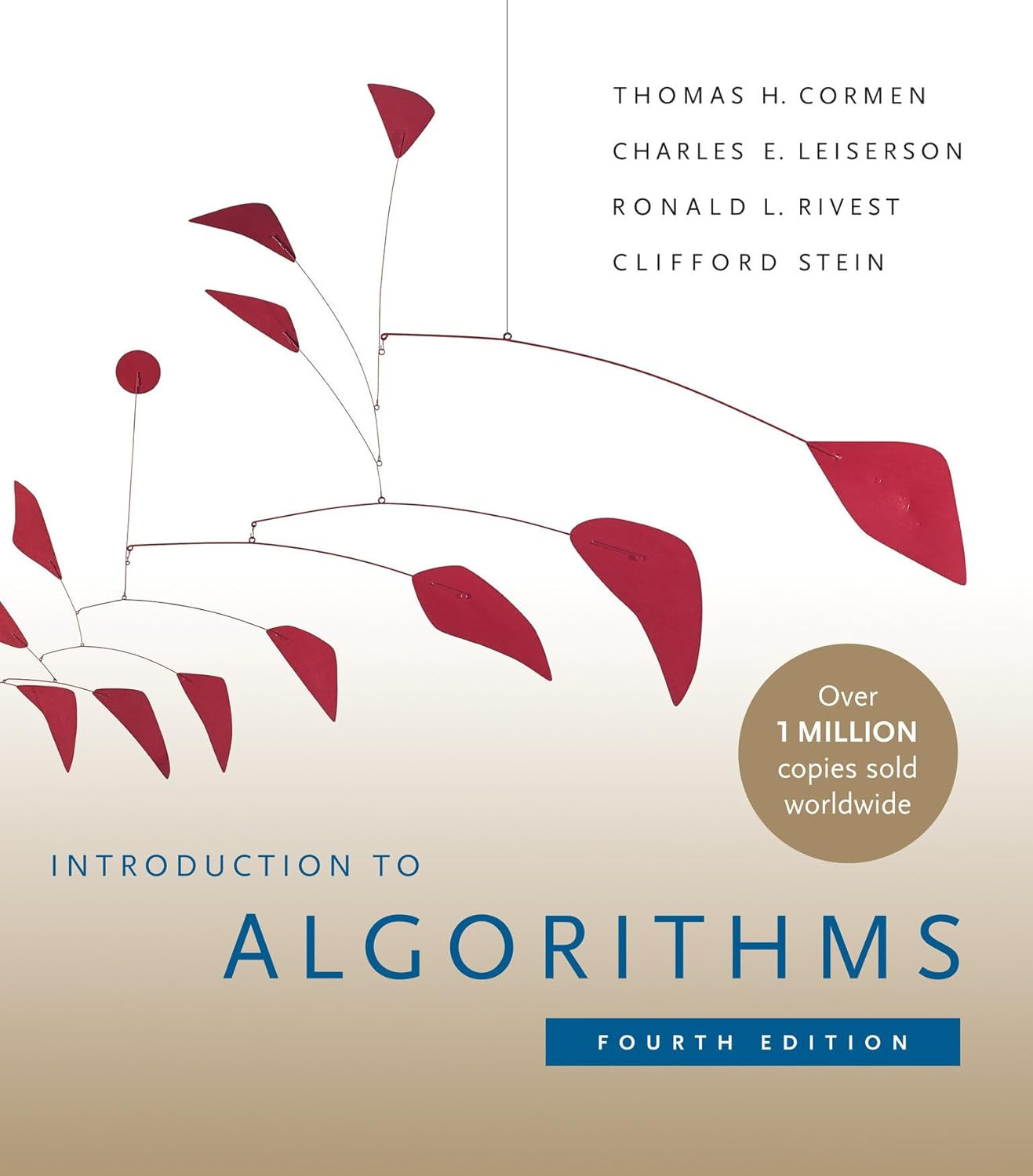
Introduction to Algorithms (4th Edition - CLRS) by Cormen, Leiserson, Rivest, and Stein
The definitive, comprehensive textbook on algorithms and data structures. While dense, it provides rigorous coverage of algorithm design, analysis, and complexity. Understanding concepts from CLRS demonstrates deep theoretical knowledge valued in challenging algorithm interview rounds. Use it as a reference for deep understanding.
Introduction to Algorithms (4th Edition - CLRS)
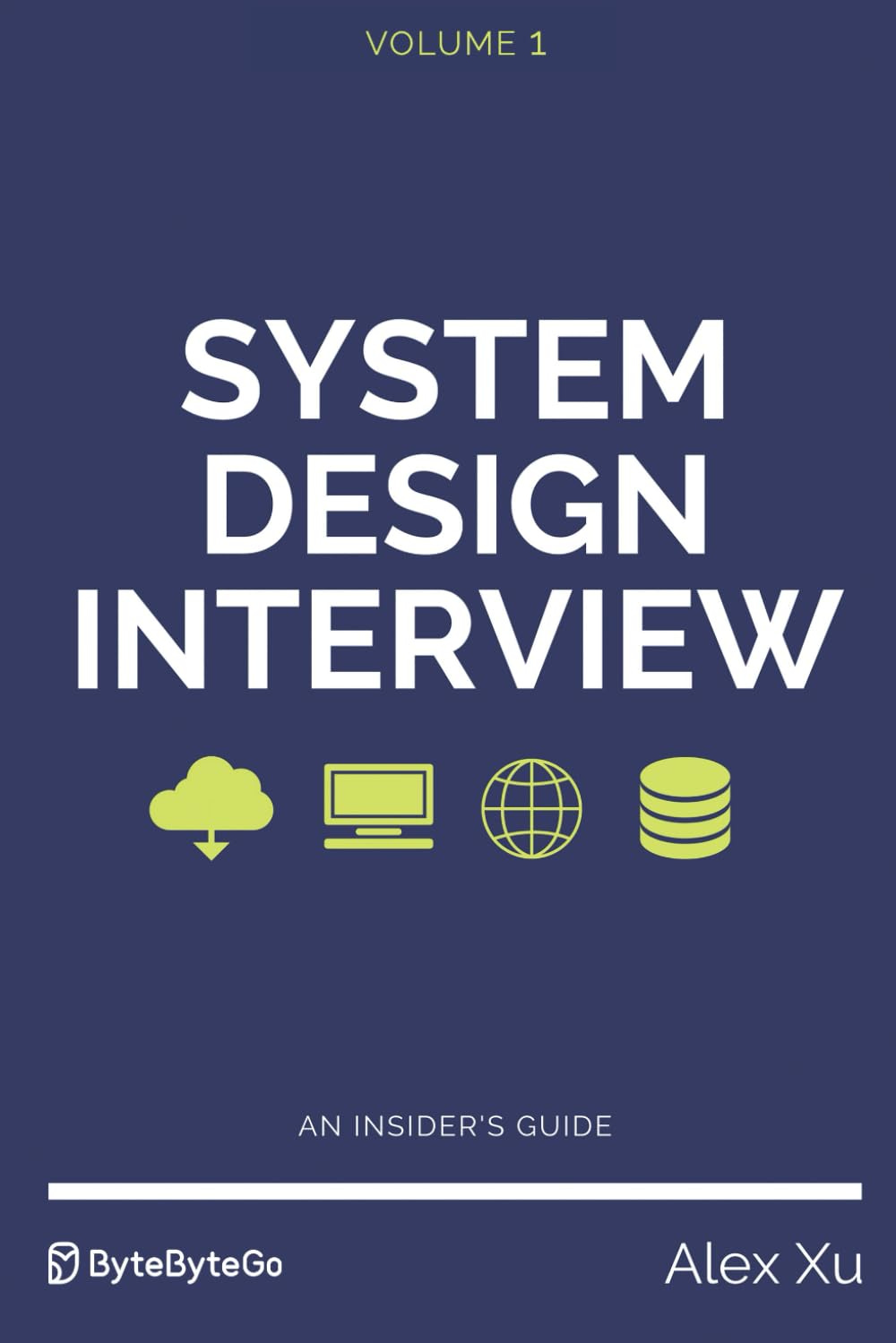
System Design Interview – An Insider's Guide by Alex Xu
Part 1 of a highly practical series focused specifically on the system design interview format. It provides a framework for approaching design questions and walks through numerous common examples like designing URL shorteners, social media feeds, and search typeaheads. Excellent for structured preparation.
https://www.amazon.com/System-Design-Interview-Insiders-Guide
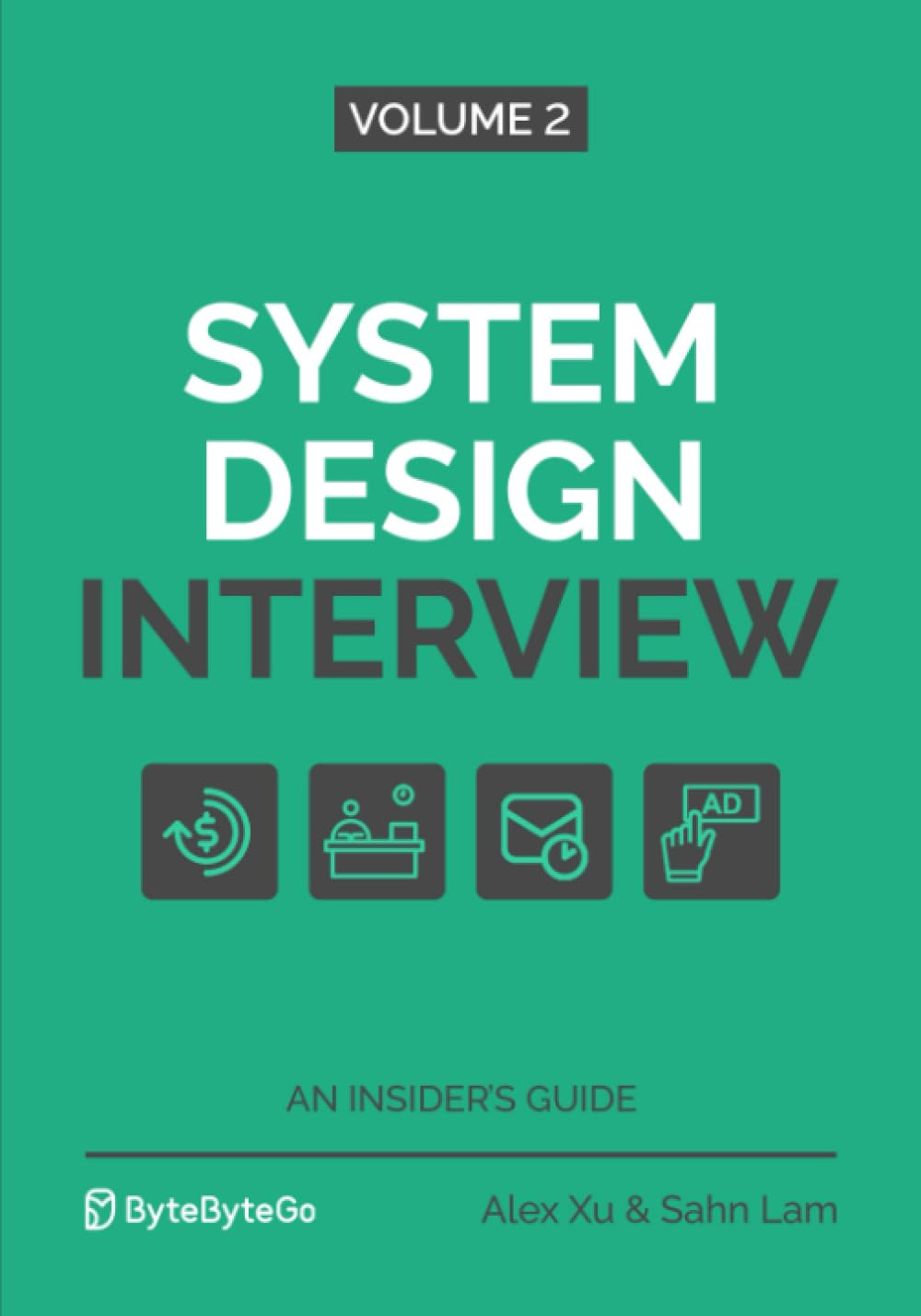
System Design Interview – An Insider's Guide: Volume 2 by Alex Xu & Sahn Lam
Builds upon the first volume with more complex and modern system design problems. Covers topics like designing streaming systems, proximity services (like Yelp), digital wallets, and Google Maps. Essential for tackling the increasingly sophisticated design questions asked in interviews.
https://www.amazon.com/System-Design-Interview-Insiders-Guide
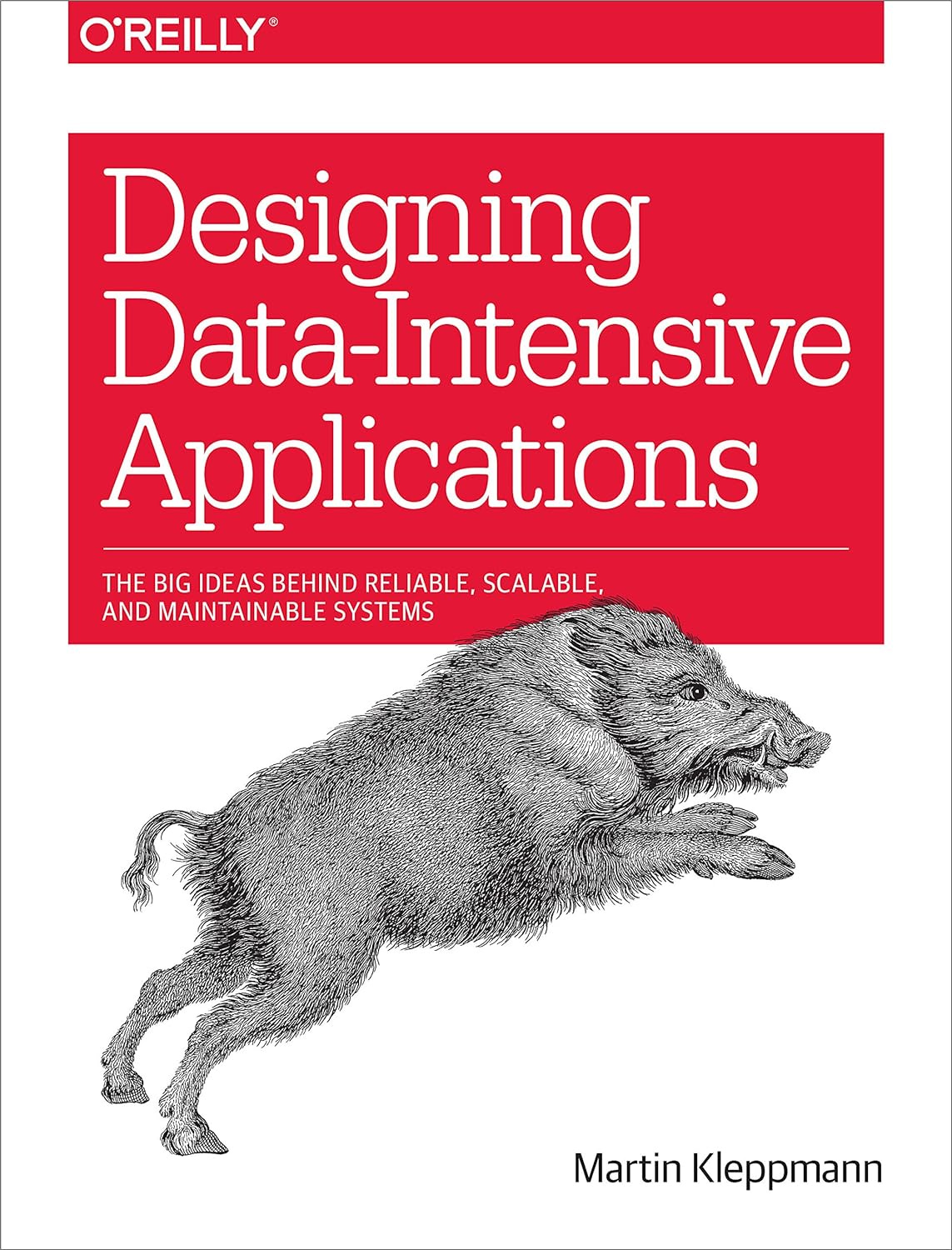
Designing Data-Intensive Applications by Martin Kleppmann
Provides a deep understanding of the fundamental principles behind modern distributed systems and databases. It explores the trade-offs in reliability, scalability, and maintainability. Essential reading for truly understanding why certain choices are made in system design, going beyond interview frameworks.
https://www.amazon.com/Designing-Data-Intensive-Applications-Reliable-Maintainable
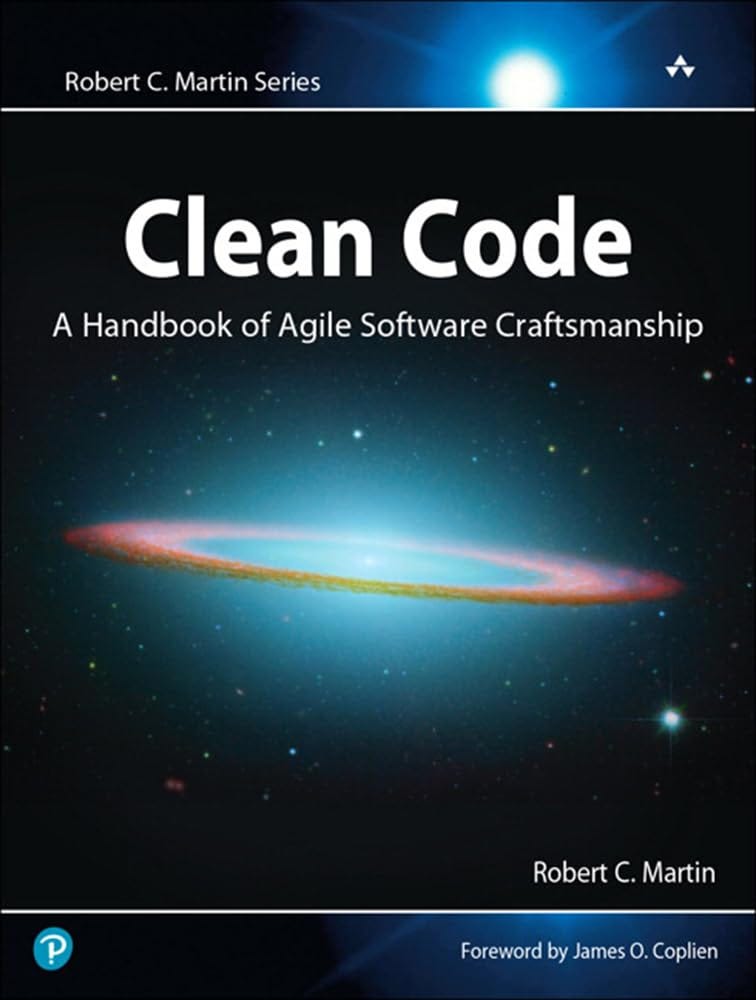
Clean Code: A Handbook of Agile Software Craftsmanship by Robert C. Martin (Uncle Bob)
Focuses on the principles, patterns, and practices of writing clean, readable, and maintainable code. It covers naming conventions, functions, comments, formatting, error handling, and more at a granular level. Demonstrating these skills in coding interviews significantly boosts your evaluation.
https://www.amazon.com/Clean-Code-Handbook-Software-Craftsmanship/
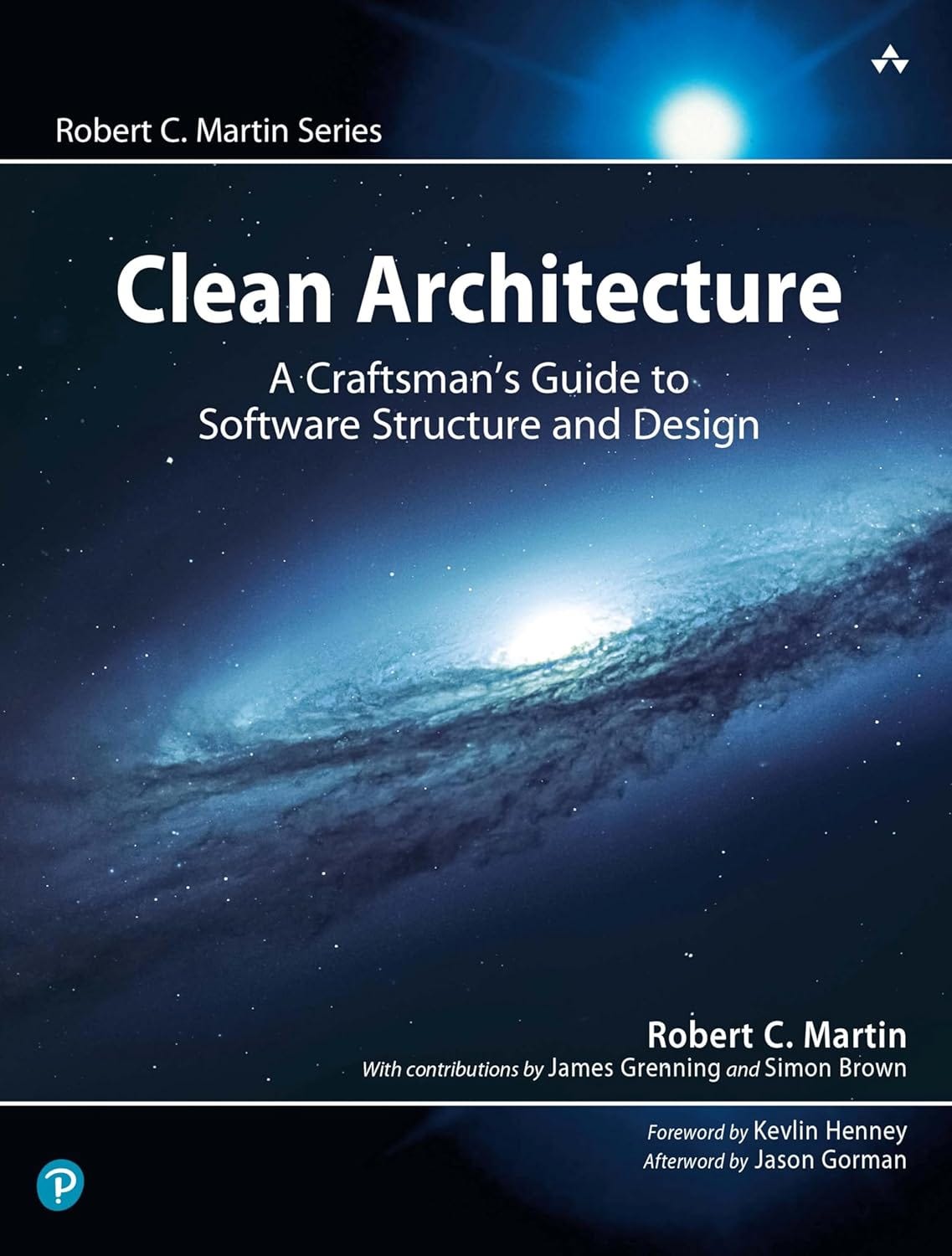
Focuses on principles and patterns for robust, maintainable, testable software architecture independent of frameworks, databases, or UIs. It delves into SOLID, component principles, architectural layers, boundaries, and managing dependencies structurally. Demonstrating this knowledge is essential for system design interviews and building scalable, long-lasting, adaptable software applications.
https://www.amazon.com/Clean-Architecture-Craftsmans-Software-Structure/dp/0134494164/
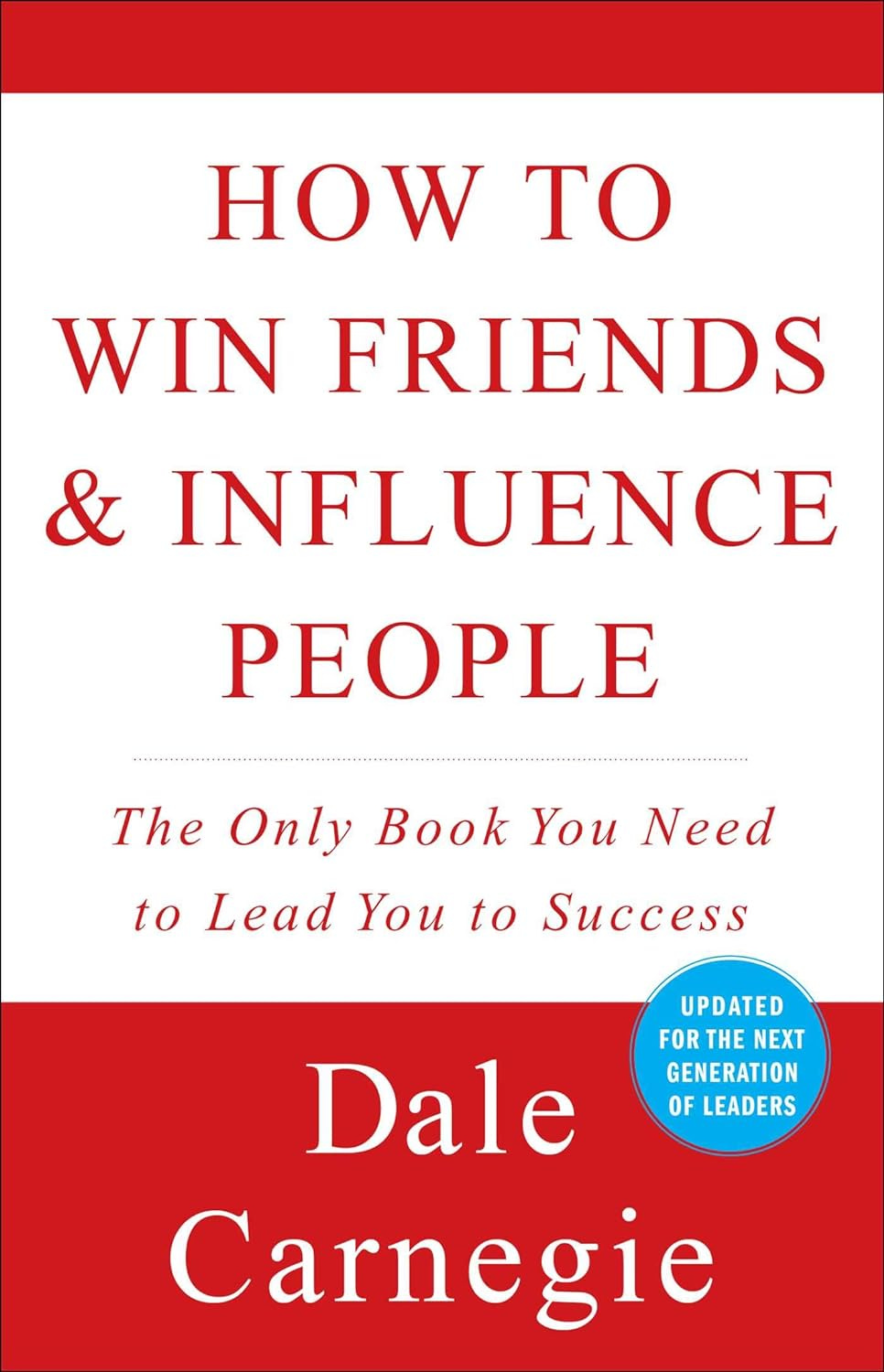
How to Win Friends and Influence People by Dale Carnegie
A timeless classic on interpersonal skills. While not technical, it's invaluable for improving communication, collaboration, and handling behavioral interview questions. Demonstrating strong soft skills, empathy, and teamwork is crucial for succeeding at FAANG companies, not just technical prowess.
https://www.amazon.com/How-Win-Friends-Influence-People
That last book might seem strange on a list of technology and software engineering books, but it is an important addition.
Skills will get you the job.
Understanding how to work with people will help you keep it.
This particular book is a timeless masterpiece on how to work with people.
Read it, because it will help you in every area of your life - your family, your friends, and your workplace.
It may save your career in these turbulent times, and hence, it is a worthy addition to this list.
Conclusion

Crowded - the demand for jobs outstrips supply!
The job market has never been so competitive.
There are a large number of people trying for a small number of jobs.
Remember the roadmap.
Work at least 3-6 hours a day.
Build a project every week.
Make sure your fundamentals are strong.
Create and post often on your LinkedIn profile.
Learn in public. Create blog posts.
Contribute to open source.
Create your own open-source projects.
Build a portfolio website.
But only after building at least 3 noteworthy projects
Do not include a calculator or anything that AI can easily generate.
Create projects that stand out!
And do not simply use someone else’s projects.
In your interview, many questions will be based on your project portfolio.
Build relationships and, if possible, mentors.
Ask for referrals only from people you already know well.
Do not forget the suggested books.
And, God-willing, you will get a referral rather than having to toss your resume out there with an acceptance rate of less than 1%.
All this is hard work, and the job search will require persistence (even the non-traditional way, which is the best way for everyone), but remember:
The Harry Potter series was rejected 29 times with its opening book.
Where would J. K. Rowling be now had she given up the 29th time?
Because she persisted, today, she is the wealthiest book author in the history of the human race.
Your journey might involve even 50 rejections or more (less if you can create an open source project yourself), but (again) remember:
Be persistent.
Keep trying.
Never lose hope.
Keep learning.
Most importantly, keep building.
Repeat, remember:
The final reward - a 100K USD per year job anywhere worldwide, remote - is worth it.
Aim for the stars, hit the moon.
All the best for your software engineering job search!
If you keep trying, you could become so skilled that you could launch a startup yourself!
But that's a story for another article.
Keep working your day job.
Keep learning, improving, upskilling, and -
Build, build, and build.
Hustle, hustle, hustle.
Focused effort will trap rich dividends.
Embrace rejection.
Embrace failure.
Embrace losing.
Every failure has a learning lesson that you can build on to become even stronger and better.
As long as you keep learning, every failure is a stepping stone to success.
The real victory is the character you build, not the job you get.
And the real failure is not another rejection - it is giving up.
He who refuses to give up: wins. - Mathew Jacob
Now go get ‘em, you tiger!

Women in tech are now finding their place!
All non-book images are AI-generated by the author with Night Cafe Studio, available at the following link: https://creator.nightcafe.studio/explore
Your support helps me continue creating articles like this one without a paywall or a paid subscription.
If you want articles like this one appearing on your business and your keywords for your platforms online, you can get them!
Contact me at:
https://linkedin.com/in/thomascherickal
For your article! (Prices are negotiable, and I offer country-wise parity pricing.)
To view my Internet presence, visit the following link:
https://linktr.ee/thomascherickal
If you want to support my writing, consider a contribution at Patreon on this link:
https://patreon.com/c/thomascherickal/membership
Alternatively, you could buy me a coffee on this link:
https://ko-fi.com/thomascherickal
Cheers!
Subscribe to my newsletter
Read articles from Thomas Cherickal directly inside your inbox. Subscribe to the newsletter, and don't miss out.
Written by

Thomas Cherickal
Thomas Cherickal
Profile: https://thomascherickal.com Portfolio: https://hackernoon.com/u/thomascherickal Presence: https://linktr.ee/thomascherickal LinkedIn: https://linkedin.com/in/thomascherickal GitHub: https://github.com/thomascherickal Email: thomascherickal@gmail.com